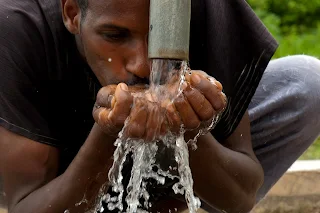Water Jerry cans and private water tankers
In Africa collecting water is dangerous. What is it like to collect water in Africa? Go get two large Jerry cans, fill them with water and walk 4 miles through woods, over hills during the heat of the day. Now do this every day or your family will have no water for drinking, cooking or bathing.
In extreme cases, in many cities and villages in Africa, the only times you drink water is after a 6 hour trip to collect clean water. Sounds crazy right? Nevertheless, the crazy part is that is for people or 1 in 7 across Africa the reality is day-to-day real and much harsher than either you or I could relate.
These are the people spending their day looking for water and then going to bed wondering where the next cup of water will come from. Women, wives, daughters, mothers, sisters wake up at 7 a.m. before the sun gets too hot and start walking in search of clean safe water.
Still walking at 8 a.m. 1 hour later, no clean water, still walking at 9 a.m. three hours later they finally get to a stream of clean river or lake water. They fill up their plastic Jerry cans with water weighting about 40 pounds when full and began the three-hour walk back home in the peak heat of the day knowing tomorrow they will get up and do it all over again.
A Jerry can is a portable fuel and gas can but in many parts of the world, it is used to carry water. Imagine carrying 80 pounds of water not down a paved road but climbing up steep hills and over rocks in a war zone. Walking for water on a daily basis is not only a back breaking physical activity, but is also dangerous risking rape. The average distance that women in Africa walk to collect water is 3.7 miles or 6 kilometers.

|
| Drinking piped water |
In Africa, over 400 million people are deprived of safe drinking water. In order to get water, people who can afford the option buy water from private water tanker operators for around $50 each month.
Africa faces a number of issues in attaining increased access to clean water. These include an insufficient number of skilled personnel, effective institutions, water scarcity and pollution. The most common hindrance is the limited money and resources put towards water infrastructure.
“Inadequate financing is the single most important factor affecting the continent’s fresh water delivery abilities,” Peter Akari, chief water policy officer of the African Water Facility at the African Development Bank.
Due to a lack of water infrastructure in rural settlements, there may be a water pump or well in a village, but if it is not maintained, they quit working.
It is not enough to build a well or water pump in African communities, they must be maintained or the water become useless to the community. In rural Ethiopia, women and children can walk up to six hours to collect water.

|
| African market day |
The public water utility, the Ghana Water Company, Ltd. had previously been able to provide water to about half of the country’s population of 20 million. Nevertheless, it started losing money for a variety of reasons, including unpaid bills and illegal connections. As a result, it could not make any significant repairs or further extend the system and lost half of its water through leakages from old pipes.
According to Scripps, in South Africa, around 19% of the rural population lacks access to a reliable water supply and 66% have no basic sanitation services. In addition, over 26% of urban and rural schools and 45% of clinics, have no water access.

|
| Collecting freshwater with Jerry cans. |
Ethiopia has one of Africa’s lowest rates of access to water supply and sanitation despite abundant surface and groundwater resources.
Out of Ethiopia’s 96 million people, 86.5 million people or 83% live in rural areas, that is 49 million people or 51% lack safe water and 76 million or 79% have no sanitation services. At most, 49% of people have access to safe water, while proper sanitation facilities are available to about 21%.
Inadequate access to safe water and sanitation services negatively impact health and productivity, especially for children. “There is not one single solution to ensuring everyone gains access to water,” says the UK charity WaterAid. Ironically, Africa is rich in freshwater: large lakes, big rivers, wetlands, and groundwater but only 4% of the continent’s available freshwater is currently being used.
Together we build awareness that boost harmony, education, and success, below are more links to articles you will find thought provoking.
- Deadliest routes for refugees
- Cooking with shea butter oil
- Worst serial killers recorded in history are women
- Indigenous healers and plants used
- Night running illness or magic
- What is back to Africa





